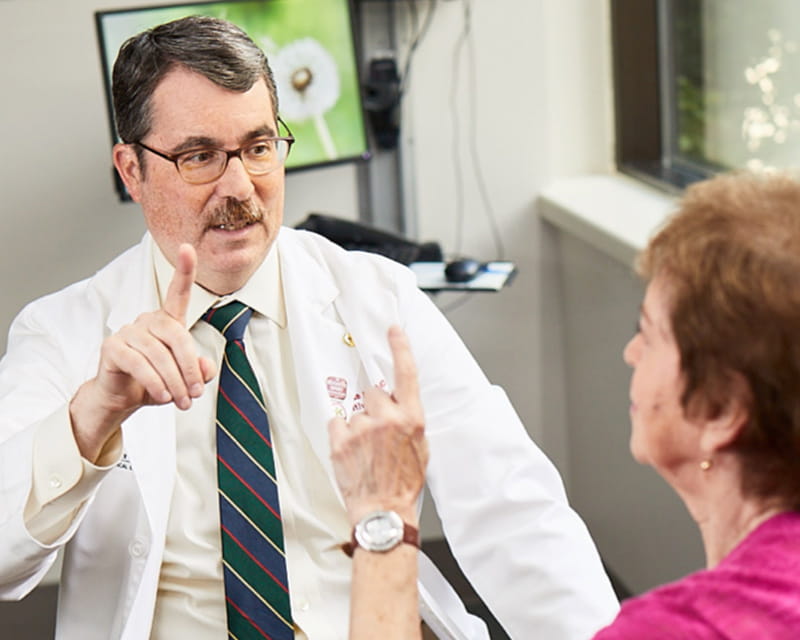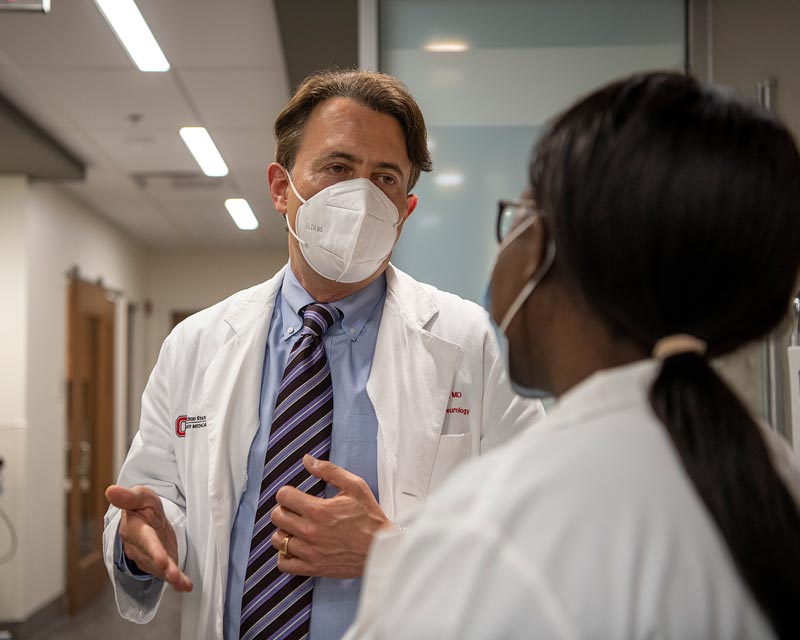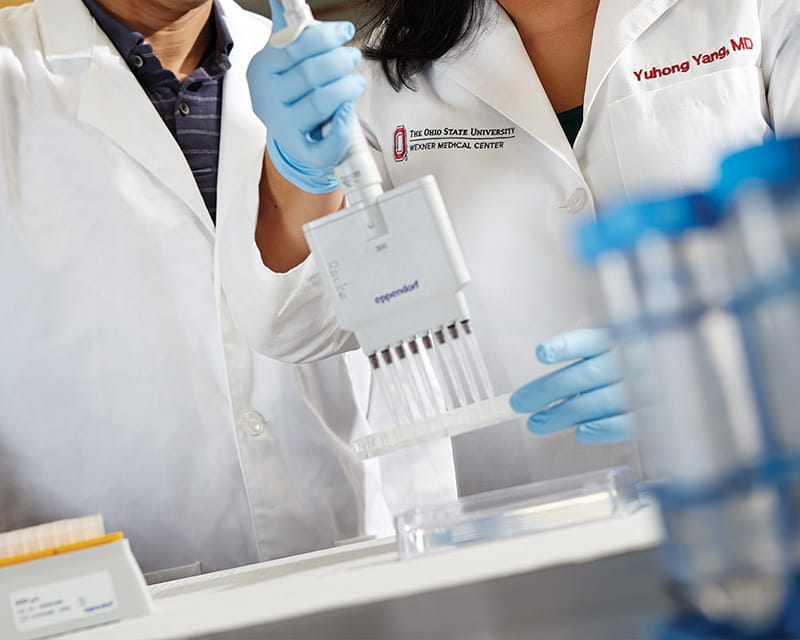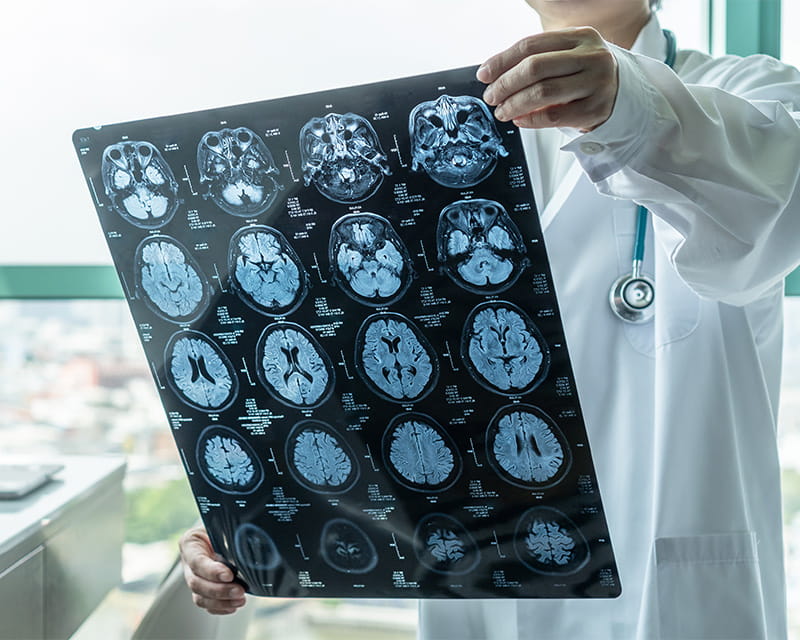
Ohio State researchers identify new biomarkers that differentiate Lewy body dementia from Alzheimer’s and Parkinson’s
 Annual international forum and summits foster innovative and rigorous MS research
Annual international forum and summits foster innovative and rigorous MS researchThe annual meeting for ACTRIMS — the Americas Committee for Treatment and Research in Multiple Sclerosis — has galvanized numerous collaborations among clinical physicians and researchers that further our understanding of, and improve care for, multiple sclerosis (MS).
Benjamin Segal, MD, professor and chair of the Department of Neurology at The Ohio State College of Medicine and co-director of the Ohio State Wexner Medical Center’s Neurological Institute, was at the forefront of ACTRIMS’ transition to an annual stand-alone meeting. This effort made, and continues to make, a major impact in the field of neuroimmunology by fostering connections that advance the frontier of multiple sclerosis research.
Since 2016, Segal has been leading or helping to plan the ACTRIMS annual meeting. He helped reshape and retool that meeting, added special sessions for young investigators and created two additional summits — one for medical students and neurology residents and another for emerging researchers. In addition to a series of lectures by thought leaders in MS, both summits feature “meet the mentor” sessions, as well as workshops on career development, women and underrepresented groups in the field, and MS beyond the Western Hemisphere.
“I want to facilitate opportunities for young investigators who strive to increase our understanding of MS pathogenesis, genetics and environmental risk factors, with the ultimate goal of advancing the clinical care of people with MS,” Segal says. “As academic leaders, it is our responsibility to support the next generation of MS researchers and clinicians and open multiple routes for their career development. We need to welcome more talented women, individuals from underrepresented groups and first-generation college students into our professional community.”
Segal’s tireless work to push the science forward on MS treatment is inspired by his patients and his “clear desire to improve the quality of their lives,” he says.
A huge advocate of rigorous and transparent science, Segal says he wants to ensure that physician-scientists and researchers work together and understand each other’s perspectives.
“A major goal of ACTRIMS is to make wet bench scientists more aware of the unmet clinical needs of individuals with MS that can be addressed through research,” Segal says. “We need to know more about the pathways that drive the human disease and to appreciate how well, or not, our animal models simulate them.”
On the other hand, clinicians should be educated about the latest insights and concepts emerging from basic science so that they can work more effectively with researchers in developing biomarker discovery and translational studies, Segal says.
Through ACTRIMS, Segal and his colleagues have influenced thousands of providers and researchers working to improve MS care. A major emphasis has been to recruit new talent to go into MS research and clinical practice.
“It is extremely rewarding and uplifting for me, personally, to witness the success of people whom I have trained,” Segal says. “I am prouder of their accomplishments than of my own.”
In five short years, Segal, who serves as a director of ACTRIMS, has worked with colleagues to transform the ACTRIMS annual forum into a nationally and internationally recognized linchpin conference.
What makes the ACTRIMS meeting unique is its single-track design, integration of talks on basic and translational science within the same session and focus on a thematic topic that changes from one year to the next. Everyone attends the same workshops and talks, which are presented in a sequential order.
“The idea is to bring everyone together in the same space, including learners, epidemiologists, imagers, translational and wet bench scientists, clinical trialists and clinicians,” Segal says.
Guiding principles for the ACTRIMS annual meeting include:
The first ACTRIMS forum using a single-track format focused on the pathogenesis of progressive MS and how to best design clinical trials to evaluate drugs for individuals with progressive disease. Segal says ACTRIMS meeting planners expected 200 people to attend. They ended up with more than 800.
The success of the ACTRIMS forum led Segal to suggest an annual summit for medical students and neurology residents. Now, this summit allows more than 70 students and residents from North America to attend the annual ACTRIMS meeting plus special additional events and lectures that are customized for the learners. This year, the summit is expanding to include trainees from Central America.
ACTRIMS covers the students’ expenses and provides educational and inspirational sessions covering everything from diagnosing multiple sclerosis to new treatments on the horizon. Representatives from the National Institutes of Health and the National MS Society also attend to share information about fellowships and grants.
There are opportunities for students to learn about and explore career options from experts who regularly see patients with MS.
“I personally know of many collaborations that germinated during ACTRIMS meetings, some of which involve the re-appropriation of new technologies to investigate the disease from a fresh perspective,” Segal says. “We also know from post-meeting surveys that many learners who attended the summit have committed to a career path in MS. Some met their next mentors at our meeting.”
In 2019, ACTRIMS added a Young Investigator Summit for researchers working in the field but who don’t have clinical experience with MS. Organized similarly to the summit for medical students and residents, the Young Investigator meeting brings together a faculty consisting of epidemiologists, imaging experts, basic scientists, clinical trialists and practicing physicians to discuss everything from the relevance of different animal models to the human disease to the current state of therapeutics in MS.
Researchers also learn how to forge collaborations with clinicians and how to stay on top of MS research efforts around the globe.
Both summits feature special workshops that address the barriers women and people from underrepresented groups face in their work and as faculty members. And both also discuss future challenges.
“Right now, what doctors need are more accurate diagnostic tools, biomarkers that are predictive of responsiveness to individual disease-modifying therapies as well as of the future clinical course and effective drugs for underserved MS populations who do not respond to currently available pharmaceutical agents,” Segal says.
For example, many people with progressive MS don’t benefit from currently available drugs, and there are no effective ways to reverse nerve damage once it occurs.
“We hope that ACTRIMS will serve as a catalyst for novel partnerships and inspire the careers of young investigators. The long-term goal is to spearhead interventions that ameliorate, and even abrogate, MS across all patient populations,” Segal says.

Ohio State researchers identify new biomarkers that differentiate Lewy body dementia from Alzheimer’s and Parkinson’s

Biomarker breakthroughs at Ohio State transform disease diagnosis, predictability and treatment

The Ohio State University Wexner Medical Center pushes boundaries for neurological care